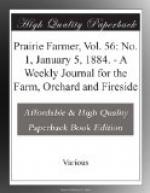oppressive quarantine regulations, and forbidding
beeves which were ripened for the highest markets
to pass beyond the shambles; and the egress of
young immature cattle on the English pastures.
Pork products up to the Chicago meeting were prohibited
by France, and they are inhibited now from Germany,
our long-time valuable customer. It was their
whims, caprices, jealousies, commercial restrictions
and bans which decreased our exports and led the Commissioner
of Agriculture to call the Chicago meeting of November.
The convention developed facts and was fruitful in results: That there were solitary cases of pleuro-pneumonia, and limited to the eastern border States; that Western herdsmen had just cause of alarm on account of the shipment of young stock West from the narrow pastures and dairy districts of the East. It was shown that across the ocean there was a morbid appetite for suspicions and facts which would justify severe restrictions and an absolute inhibition of our products.
The Cattle Commission formed by the Treasury Department gave decided opinions and imparted valuable information, but they were constrained to admit that they were powerless in an emergency to stop the spread of contagious diseases, and that it was a vain hope that there would be an increased foreign demand for our cattle and meat without radical Congressional enactment.
Skilled veterinarians, fancy breeders, political economists, and savants from the East met the alarmed ranchmen, enterprising breeders, and delegations and officials from many agricultural and State associations, representing millions of cattle and hundreds of millions of dollars, resolved that a meeting should be held at Washington, and a committee was appointed to secure appropriate legislation.
In the discharge of duties assigned to the Secretary I at once repaired to Washington for consultation and to gather pertinent facts. The heads of the State Treasury and Agricultural Departments were awake to the necessity of early and radical legislation. President Arthur evinced great cordiality, and gave good proof of his interest by calling attention in the annual message to the approaching meeting in Washington, which I have called the 10th of January.
FACTS.
I have sent out in a circular
to the committee the following
“head-land” facts
of startling import, which should be well
considered:
1. That there is an investment of $1,008,000,000 in cattle as estimated by the Department of Agriculture, representing 41,171,000 animals. That of swine is $291,000,000, representing over 43,000,000 animals.
2. That losses annually on exportation of cattle and beef, consequent upon restrictive regulations and the decreased relative consumption of our beef, aggregates many millions of dollars. We reach an approximate estimate by these facts relative to our foreign trade as follows:
The exports of 1880-81 were
368,463 animals. Those of 1882-83
were 212,554—a
loss of 155,009 animals, and in value a loss
of $11,506,000 in two years.




